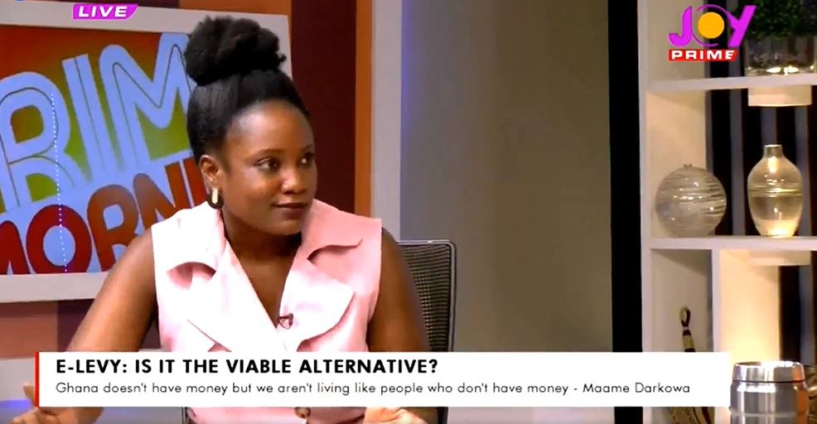An International Trade Law Expert, Maame Darkowa Awinador-Kanyirige, has bemoaned what she calls the high level of wastefulness in the country and government’s unwillingness to cut down its expenditure.
She emphasised that for many years, the state has been unable to institute pragmatic strategies and solutions to increase revenue generation, a reason the country’s economy has been in crisis.
Speaking in an interview on Prime Morning on Thursday, February 3, she stated unequivocally that “being broke [as a country] is just the reality of what is happening on the bigger scale but the reality also is that we don’t have money but we are also not living like people who don’t have money.”
Maame Awinador-Kanyirige added that the Electronic Transactions Levy (e-levy) may help the state to raise some revenue in the immediate term; however, the best approach is for government to reduce its expenditure and boost local production.
On the e-levy, she noted that “if you look at the estimate of how much to expect, it is not even enough…we have debts to pay.”
“People already pay taxes but the cost of living is high that is why people are not understanding. What GHC100 could do last year, it cannot do this year. What is a ¢1,000 these days? We have to be honest as to what the cost of living is to even be able to say if you’re spending this money a day, you should be able to pay the e-levy.”
“It [e-levy] is not the only way but the thing is that it’s going to require heavy adjustments; are we willing to make? If we go to the IMF, the first thing the IMF will do or say is ‘cut expenditure’ – the very thing that we don’t want to do. We are spending on things that are not necessities for people who are where we are at,” she added.
Meanwhile, a Professor of Economics and Finance, Prof. Godfred Bokpin, has blamed the government for its failure to address the inefficiencies and low compliance with existing tax policies over the years.
He says government’s inability to block the leakages in tax revenues is what has rendered the economy weak, a development he warns could deprive the state of its objective to remain competitive on the digital economy market.
“You want to look at the overall drive of the country and you realise that imposing this tax is more or less to reverse or redirect the direction of this economy and you’re going to lose massively in terms of competitiveness in the digital economy,” he spoke on the same show.
Latest Stories
-
Court to begin trial of two prisoners accused of escaping
13 minutes -
Joe Biden says he could have defeated Donald Trump
29 minutes -
Zoomlion Ghana earns praise for clean up before and after presidential inauguration
5 hours -
Demystifying derivatives–clarifying interest rate risk management
5 hours -
Telecel Ghana crowns millionaire in the More Money Promo
5 hours -
Power crisis looms as government needs $90m to avert ‘dumsor’ – GRIDCo report
5 hours -
Barcelona defeat Athletic without Olmo to reach Spanish Super Cup final
5 hours -
Theodore Dzeble: The return of another John
6 hours -
This is your moment in history, my dear friend’s wife
6 hours -
Call me ‘Ɔsahene’ in Parliament – Afenyo-Markin announces new title to colleague MPs
6 hours -
A letter to President John Mahama – A friend you need
6 hours -
Maintain E-Levy to support Women’s Development Bank, SMEs – GUTA tells Mahama
7 hours -
Nominations open for 2025 JoyNews Impact Makers: Celebrating ordinary people, making extraordinary impact
7 hours -
Tanko Foundation rescues 3 nursing mothers detained over medical bills
7 hours -
Cyber troopers: The ‘news’ handles spreading disinformation, hate speech on social media
7 hours

